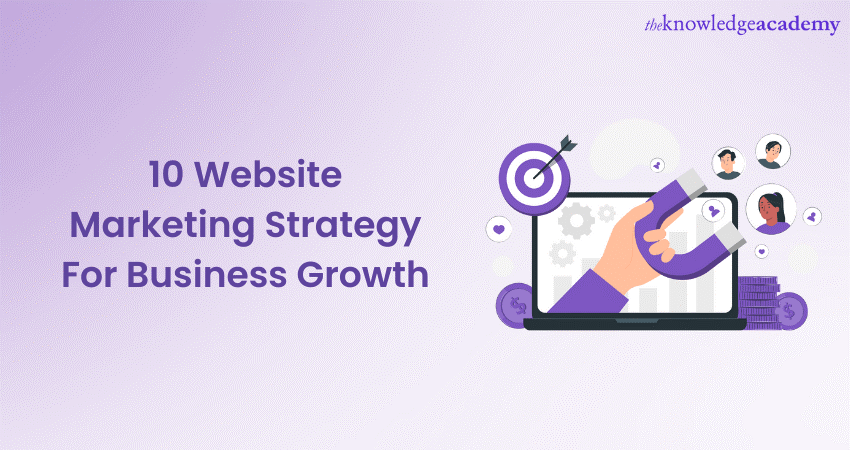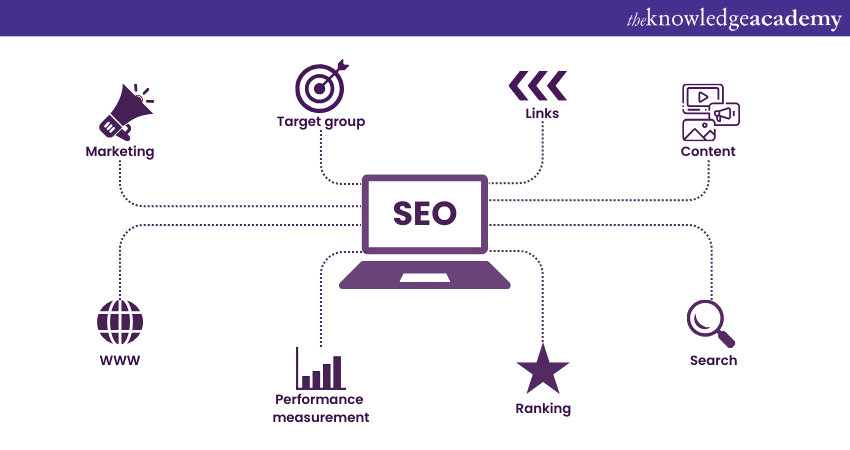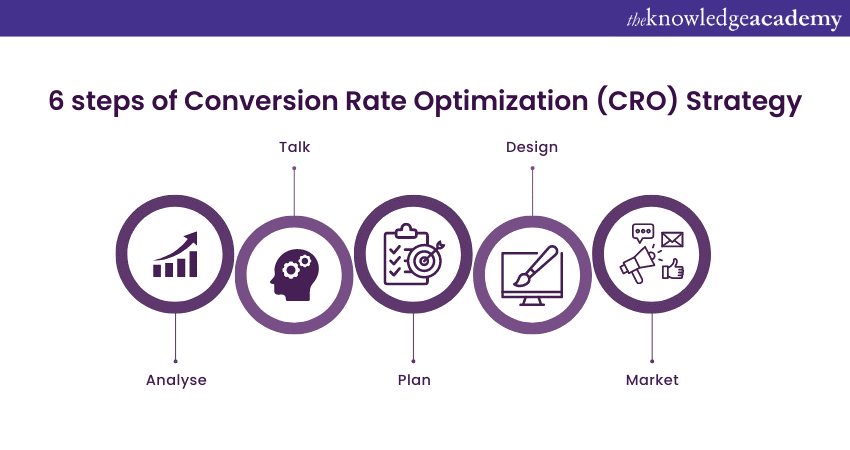We may not have the course you’re looking for. If you enquire or give us a call on 01344203999 and speak to our training experts, we may still be able to help with your training requirements.
Training Outcomes Within Your Budget!
We ensure quality, budget-alignment, and timely delivery by our expert instructors.

A strong online presence is paramount for businesses seeking growth and wider reach. A well-crafted website is not only a virtual storefront but also a powerful marketing tool that can drive business success. To maximise the impact of your online platform, it's essential to implement effective Website Marketing Strategies.
According to Statista, In April 2023, there were around 5.18 billion internet users worldwide. This blog explores the intricacies surrounding effective Website Marketing Strategy that can help businesses enhance their online visibility, attract their target audience, and drive substantial growth.
Table of Contents
1) What is a Website Marketing Strategy?
2) Ten Website Marketing Strategies
a) Search Engine Optimisation (SEO)
b) Content Marketing
c) Social Media integration
d) Pay-Per-Click (PPC) advertising
e) Email Marketing
f) Conversion Rate Optimisation (CRO)
g) Influencer collaboration
h) User Experience (UX) enhancement
i) Mobile optimisation
j) Video Marketing
3) Website Marketing Strategy tools
4) Conclusion
What is a Website Marketing Strategy?
A marketing strategy is a strategic plan outlining actions to achieve business objectives. It involves understanding target audiences, market trends, and product positioning. This strategy guides decisions on branding, messaging, and communication channels, driving growth and building a strong brand presence in the competitive market.
Unlock your Marketing potential: Join now for expert-led Marketing Training and propel your business to new heights!
Ten Website Marketing Strategies
Website Marketing Strategies are a set of deliberate actions designed to enhance a business's online presence and drive growth. It involves SEO, compelling content, Social Media integration, PPC advertising, email campaigns, UX enhancement, influencer collaboration, mobile optimisation, and video utilisation. These tactics synergise to enhance online presence, drive traffic, engage audiences, and boost conversions, fostering business growth in the digital landscape.
Search Engine Optimisation (SEO)

Search Engine Optimisation, or SEO, is the cornerstone of any successful Website Marketing Strategy. It involves optimising your website's content, structure, and code to improve its visibility on Search Engine Results Pages. By incorporating relevant keywords, optimising meta tags, creating high-quality backlinks, and ensuring fast loading times, you can enhance your website's organic search rankings. Appearing at the top of search results not only increases your website's visibility but also establishes credibility and trust among users actively seeking your products or services.
Implementing a robust SEO strategy requires meticulous research and continuous monitoring of search engine algorithms. By staying updated on the latest trends and best practices, you can drive targeted organic traffic to your website, contributing significantly to your business's growth.
Benefits
a) Improved organic visibility: Higher search engine rankings lead to increased visibility and more organic website traffic.
b) Targeted traffic: Optimised content attracts users actively searching for relevant information or products.
c) Long-Term results: Properly executed SEO efforts can lead to sustained traffic growth over time.
Content Marketing
Content Marketing is a potent way to establish your brand's authority and engage your target audience. By creating valuable, informative, and entertaining content, such as blog posts, articles, videos, infographics, and podcasts, you can attract and retain visitors to your website. Consistent content creation not only helps in addressing your audience's pain points and answering their questions but also displays your industry expertise.
A well-executed Content Marketing strategy involves understanding your audience's preferences, crafting compelling narratives, and promoting your content through various channels, such as Social Media and email newsletters. Over time, valuable content establishes your brand as a trusted source, driving organic traffic and fostering customer loyalty.
Benefits
a) Establish authority: High-quality content positions your brand as an industry thought leader.
b) Organic traffic boost: Valuable content attracts organic traffic through search engines and Social Media.
c) Stronger customer relationships: Providing helpful content builds trust and fosters long-term customer loyalty.
Elevate your brand with our Content Marketing Masterclass and unlock the art of crafting compelling narratives that captivate, convert, and drive business growth.
Social Media integration
Social Media platforms offer a dynamic space for connecting with your audience, building brand awareness, and directing traffic to your website. Integrating Social Media buttons, sharing options, and engaging content on your website encourages visitors to interact with your brand across multiple channels. By fostering a consistent brand voice and sharing valuable content, you can create a community of loyal followers who actively engage with and share your website's content.
Furthermore, Social Media advertising allows you to target specific demographics and reach a wider audience. The collaboration between your website and Social Media presence can significantly amplify your brand's reach, driving traffic and fostering meaningful connections with potential customers.
Benefits
a) Expanded reach: Integrating Social Media widens your brand's audience and encourages sharing.
b) Real-time interaction: Social Media feeds and comments facilitate direct engagement with customers.
c) Brand authenticity: Active Social Media presence humanises your brand and increases credibility.
Pay-Per-Click (PPC) advertising
PPC advertising is a paid Digital Marketing strategy that offers immediate visibility and targeted traffic to your website. Platforms like Google Ads and Social Media networks allow you to create ads that appear when users search for specific keywords or fit predefined demographics. These ads direct users to relevant landing pages on your website, increasing the likelihood of conversions.
Effective PPC campaigns involve thorough keyword research, compelling ad copy, and well-designed landing pages optimised for conversion. While PPC requires a financial investment, it offers a rapid way to drive traffic, test different marketing approaches, and achieve measurable results.
Benefits
a) Immediate visibility: PPC ads provide instant visibility on search engines and social platforms.
b) Precise targeting: You can reach specific demographics, increasing the likelihood of conversions.
c) Measurable ROI: Detailed analytics allow you to track ad performance and optimise campaigns.
Email Marketing
Despite the rise of newer Marketing channels, Email Marketing remains a powerful tool for nurturing leads, retaining customers, and driving website traffic. Building an email subscriber list enables you to communicate directly with your audience, sharing personalised content, promotions, and updates.
Segmenting your email list based on user preferences and behaviours allows you to deliver tailored messages, increasing engagement and click-through rates. Incorporating Calls to Action (CTAs) in your emails that lead recipients to relevant pages on your website can drive targeted traffic and foster a sense of exclusivity among your subscribers.
Benefits
a) Direct communication: Email marketing establishes a personalised and direct line of communication.
b) Lead nurturing: Regular email campaigns keep your brand in the minds of potential customers.
c) Repeat business: Engaging email content encourages purchases and brand loyalty.
Conversion Rate Optimisation (CRO)

Conversion Rate Optimisation focuses on enhancing your website's User Experience to guide visitors seamlessly through the conversion funnel. By analysing user behaviour, conducting A/B testing, and making data-driven changes, you can optimise landing pages, forms, and CTAs to maximise conversions.
A user-friendly website with intuitive navigation, clear messaging, and a streamlined checkout process can significantly boost your conversion rates. CRO not only improves your website's effectiveness in converting visitors into customers but also enhances overall user satisfaction, encouraging repeat visits and referrals.
Benefits
a) Increased conversions: Optimised User Experience leads to higher conversion rates and sales.
b) Cost-Effective: Improving existing site elements is often more economical than acquiring new traffic.
c) Data-Driven decisions: A/B testing and analytics guide informed website improvements.
Influencer collaboration
Influencer Marketing leverages the reach and credibility of individuals with a significant online following in your industry. Collaborating with relevant Influencers can expose your brand to their engaged audience, driving traffic to your website and increasing brand awareness.
Identify Influencers whose values align with your brand and engage in authentic partnerships. Influencers can create content, such as reviews, tutorials, or endorsements, that directs their followers to explore your website. Such collaborations can provide a powerful boost to your website's traffic and introduce your brand to a new pool of potential customers.
Benefits
a) Expanded audience: Partnering with Influencers exposes your brand to their dedicated followers.
b) Enhanced trust: Influencer endorsements build trust and credibility among potential customers.
c) Unique content: Collaborations result in creative and engaging content that resonates with audiences.
Unlock the power of Pay Per Click (PPC) Advertising – Join our Pay Per Click (PPC) Masterclass and elevate your Digital Marketing strategy today!
User Experience (UX) enhancement
A seamless User Experience is pivotal for encouraging visitors to explore your website, engage with your content, and convert into customers. UX encompasses various aspects, including website design, navigation, page load speed, and mobile responsiveness.
Invest in responsive web design to ensure that your website looks and functions well on all devices, enhancing accessibility and user satisfaction. Intuitive navigation, clear Calls to Action, and visually appealing layouts can captivate visitors and keep them engaged, driving longer session durations and repeat visits.
Benefits
a) Lower bounce rates: A seamless User Experience keeps visitors engaged and reduces bounce rates.
b) Improved conversion: Intuitive navigation and clear CTAs guide users towards desired actions.
c) Positive reputation: A user-friendly website reflects positively your brand's professionalism.
Mobile optimisation
As mobile usage continues to grow, optimising your website for mobile devices is no longer an option but a necessity. A mobile-optimised website ensures that users can easily navigate, interact, and convert regardless of the device they are using.
Implement responsive design principles to ensure that your website adapts fluidly to different screen sizes. Optimise images and media for faster load times on mobile networks. Utilise mobile-specific features, such as click-to-call buttons and location-based services, to enhance User Experience and drive foot traffic to physical locations.
Benefits
a) Wider accessibility: Mobile optimisation ensures your site is accessible to users on various devices.
b) Improved SEO: Google prioritises mobile-friendly sites in search results, boosting visibility.
c) Enhanced user satisfaction: Mobile-optimised sites provide smoother navigation and better user experiences.
Video Marketing
Video Marketing is a potent tool for modern businesses. With captivating visuals and compelling storytelling, videos forge strong connections, driving engagement and conversions. Platforms like YouTube and Social Media amplify reach, making it a vital strategy for today's brands.
Through concise videos, brands convey messages, display products, and leave lasting impressions. By integrating Video Marketing, businesses enhance authenticity, raise brand awareness, and fuel growth in the digital landscape.
Benefits
a) Engaging visual storytelling: Video Marketing captivates audiences through compelling narratives, forging deeper connections, and boosting brand engagement.
b) High conversion potential: Engaging videos effectively communicate product benefits, driving higher conversion rates and sales.
c) Enhanced brand awareness: Shareable videos on platforms like YouTube and Social Media extend your brand's reach, fostering broader recognition.
Website Marketing Strategy tools
Marketing tools play a crucial role in optimising campaigns, reaching target audiences, and achieving overarching business goals. Here are some key tools and their significance:
a) Google Analytics
Google Analytics offers comprehensive insights into website traffic, user behaviour, and conversion rates. It enables businesses to track Key Performance Indicators (KPIs), such as page views, bounce rates, and click-through rates. This data-driven tool helps refine marketing strategies, identify successful channels, and optimise content for maximum impact.
b) Keyword Research Tools
Tools like Google Keyword Planner and SEMrush assist in identifying relevant keywords and phrases that potential customers use when searching online. By integrating these keywords into content, businesses enhance their search engine visibility and attract targeted traffic.
c) Content Management Systems (CMS)
Platforms like WordPress, Drupal, and Joomla facilitate content creation, organisation, and publication. These systems enable businesses to manage websites efficiently, create engaging blog posts, and update content seamlessly, contributing to a consistent and dynamic online presence.
d) Social Media Management Tools
Tools like Hootsuite, Buffer, and Sprout Social streamline Social Media Marketing efforts. They allow businesses to schedule posts, manage multiple accounts, and analyse engagement metrics, optimising Social Media campaigns and maximising reach.
e) Email Marketing Platforms
Platforms such as MailChimp, Constant Contact, and HubSpot simplify Email Campaign Management. They offer customisable templates, segmenting options, and analytics, enabling businesses to deliver targeted content to specific audiences and track campaign effectiveness.
f) Search Engine Optimisation (SEO) Tools
Moz, Ahrefs, and Yoast SEO are vital for optimising website content. These tools offer insights into backlinks, keyword rankings, and technical SEO aspects, helping businesses improve their website's search engine visibility and organic traffic.
g) Pay-Per-Click (PPC) Advertising Tools
Google Ads and Facebook Ads Manager facilitate the creation, management, and optimisation of PPC campaigns. These tools provide detailed targeting options, budget control, and performance tracking, ensuring ads reach the right audience and generate measurable results.
h) Conversion Rate Optimisation (CRO) Tools
Tools like Optimizely and Crazy Egg assist in analysing user behaviour and testing different website elements to enhance conversions. A/B testing, heatmaps, and user session recordings enable businesses to fine-tune their websites for optimal User Experience and higher conversion rates.
i) Influencer Marketing Platforms
Platforms like AspireIQ and Influencity connect businesses with relevant influencers for collaborations. These tools streamline the influencer discovery process, negotiation, and performance tracking, amplifying brand visibility and credibility.
j) Marketing Automation Platforms
Marketo, HubSpot, and ActiveCampaign automate various marketing tasks, from lead nurturing to email sequences. These platforms enable businesses to deliver personalised content at scale, nurturing leads and guiding them through the sales funnel.
Conclusion
In Website Marketing, strategic tools are essential. These instruments empower businesses to navigate the digital landscape with precision, optimising campaigns, engaging audiences, and fostering growth. In this digital age, the collaboration between innovative tools and creative strategies forms the foundation for online success. Now that you know the right set of Website Marketing Strategy, running campaigns will become a lot easier in the long run.
Unlock the power of personalised communication – Elevate your brand with effective Email Marketing today!
Frequently Asked Questions
Upcoming Digital Marketing Resources Batches & Dates
Date
 Digital Marketing Course
Digital Marketing Course
Fri 24th Jan 2025
Fri 28th Mar 2025
Fri 23rd May 2025
Fri 25th Jul 2025
Fri 26th Sep 2025
Fri 28th Nov 2025







 Top Rated Course
Top Rated Course



 If you wish to make any changes to your course, please
If you wish to make any changes to your course, please


